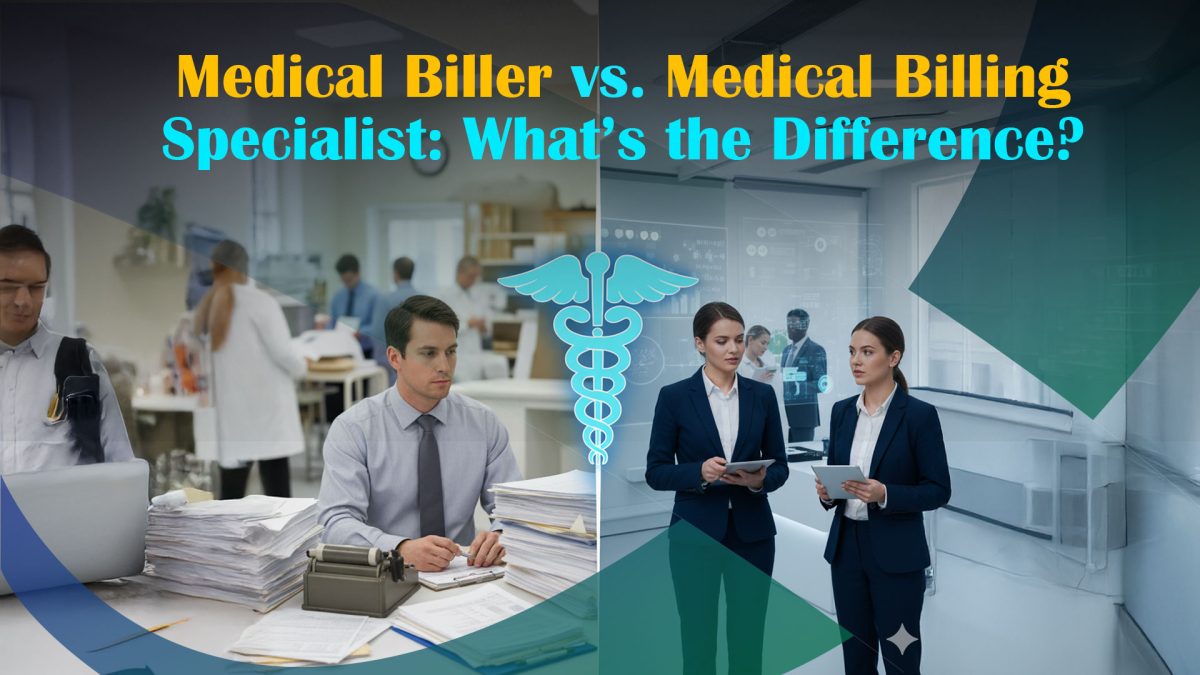The backend of healthcare administration is a labyrinthine world, nigh on impossible to navigate for someone new to the domain. Processing claims and medical billing make for a two-headed behemoth, untamable, ready to such administrators into an abysmal pit. But from those pits, two superhero names emerge—medical biller and medical billing specialist. Are these two terms interchangeable, meaning they refer to the same thing? Or, is there a difference? Well, luckily, that’s what we’re going to discuss today. So, let’s cut to the chase!
1. The BIG Picture: Why Medical Billing Matters

Nope, we ain’t going back to the intro. Bear with us, and you’ll understand. You see, the healthcare system is sustained by earned revenues—well, mostly. Without a steady cash inflow, no hospital or clinic can stay afloat in the long term. There are salaries for the staff, equipment to purchase and maintain, administrative expenses, and so on and so forth. All in all, running a healthcare facility requires a lot of money—a lot of it. And a lion’s share of the money comes from medical billing.
Medical billing is the bridge between healthcare services and revenue collection. After a physician diagnoses or treats a patient, that information needs to be translated into standardized codes. These codes are then submitted to insurance companies or government payers, who then reimburse the provider accordingly. It sounds simple, but it’s anything but.
There are regulations to follow, different payers to deal with, denied claims to resubmit, and often, frustrated patients to explain things to. The accuracy and efficiency of this process directly affect how fast a provider gets paid and how smoothly a medical office runs. That’s why roles like medical billing specialists have become essential not just in hospitals but in the medical process outsourcing domain at large.
2. So, Who’s A Medical Biller?
A medical biller is someone who’s responsible for preparing and submitting insurance claims to insurers. That description looks simple, but the job is anything but. Because a medical biller is tasked with getting the claims out, manage the cash flow, and ensure all stakeholders are happy about money matters.
2.1. Snapshot of the Key Responsibilities of a Medical Biller:
- Creating medical claims based on coding inputs.
- Submitting claims to insurance providers.
- Tracking claim status and following up on unpaid claims.
- Handling denials or rejections and resubmitting corrected claims.
- Managing patient billing for out-of-pocket expenses.
- Communicating with insurance companies, providers, and patients about billing issues.
2.2. Skills Needed:
- A thorough knowledge of medical terminology and coding basics (though they may not be the primary coders).
- Familiarity, nay, expertise in healthcare billing software (like Kareo, AdvancedMD, Athenahealth).
- Understanding of insurance guidelines and claim submission rules.
- Basic accounting skills.
3. Who’s A Medical Billing Specialist, then?
The term “medical billing specialist” does sound like a fancier version of “medical biller,” and, in many cases, the two terms are used interchangeably. But the former has a broader scope than most would realize, not least in an industry that’s overloaded with service requests.
3.1. Key Responsibilities of a Medical Billing Specialist:
In addition to everything a medical biller does, a medical billing specialist may also:
- Verify patient insurance eligibility and coverage prior to treatment.
- Interpret clinical documentation to ensure proper coding and billing alignment.
- Analyze billing trends to identify issues or areas of revenue leakage.
- Train junior billers or handle complex payer issues.
- Serve as the main point of contact for billing-related audits and compliance checks.
- Coordinate with coders, providers, and administrators for documentation accuracy.
3.2. Skills Needed to be a Medical Billing Specialist
- Deep knowledge of ICD-10, CPT, and HCPCS coding systems.
- Understanding of compliance frameworks like HIPAA.
- Advanced proficiency in electronic health record (EHR) systems.
- Ability to analyze and optimize billing cycles.
- Strong communication and customer service skills.
Here’s how you would differentiate between a medical biller and a medical billing specialist, if you were so inclined: while a medical biller has a keen focus on daily operations, the medical billing specialist seeks out patterns and adds meaning to them. They also handle complex billing issues and ensure long-term compliance and efficiency. And efficiency and compliance combined make for the most critical bedrock the healthcare system stands on.
4. The Clerk vs. Consultant Analogy: To Make You Understand Better!
You can think of a medical biller as a finance clerk, tasked with processing transactions without unnecessary hiccups. A medical billing specialist, on the other hand, is like a financial consultant, who looks after the whole billing system and keeps it slick, healthy and compliant. Ah, now you understand, don’t you?
5. Certification and Career Paths
In the U.S., medical billers and billing specialists often pursue certifications from institutions like:
- AAPC (American Academy of Professional Coders) – e.g., Certified Professional Biller (CPB)
- AHIMA (American Health Information Management Association) – e.g., Certified Revenue Cycle Representative (CRCR)
While a medical biller might start with basic training and move into the role with on-the-job experience, a medical billing specialist typically has:
- Formal certifications
- Several years of experience
- Cross-functional knowledge of coding, billing, compliance, and software
This layered expertise also translates into higher pay. According to industry reports:
- Average Medical Biller salary: $40,000–$48,000 annually
- Average Medical Billing Specialist salary: $50,000–$65,000 annually
Of course, those working in medical process outsourcing may have different salary brackets depending on geography, but the specialist role remains more senior.
6. So, Which One Do You Need?
Assuming you, the reader, is a healthcare provider, here’s a table to help you choose your specialist (thank us later!):
| Need | Recommended Role |
| Routine claim submission | Medical Biller |
| Managing complex denials or audits | Medical Billing Specialist |
| Basic data entry and patient billing | Medical Biller |
| Workflow optimization and analytics | Medical Billing Specialist |
| Short-term staffing for high-volume months | Medical Biller |
| Long-term strategy and compliance support | Medical Billing Specialist |
7. A Word on Medical Process Outsourcing (MPO)
Since we are discussing such important healthcare roles as medical billers and medical billing specialists, it only makes sense to discuss medical process outsourcing, at least in some detail. The rise of medical process outsourcing is a direct consequence of the growing complexities in healthcare administration, and also the push for more efficiency and cost reduction.
A great many healthcare providers are outsourcing their requirements to time-tested medical process outsourcing companies in countries like India and the Philippines. This quiet, behind-the-scenes revolution is transforming the healthcare systems of first-world countries as we speak, but not many understand why MPO is so important.
7.1. Why the Shift to MPO?
- Cost savings: Outsourcing reduces overhead and staffing costs.
- 24/7 operations: Offshore teams work in different time zones to keep claims moving without a break.
- Access to skilled talent: Countries like India produce thousands of medical billing specialists trained specifically for global markets.
- Scalability: For healthcare providers, it becomes easier to ramp up operations without hiring in-house teams.
MPO firms typically employ both medical billers and medical billing specialists, with the latter often leading operations, ensuring compliance, and optimizing workflows.
8. Wrapping It Up
We bet you now know enough to decide who you want to hire. But if you are really looking to silence a few remaining doubt gremlins, here’s what you got to ask yourself, “Am I looking for someone to press the buttons, or someone who knows which buttons to press, when, and why?” That should help you decide. Oh, and if you are still unsure about the true worth of medical process outsourcing companies in the healthcare domain, feel free to ask us. Nothing makes us happier than answering your questions and dispelling myths.



